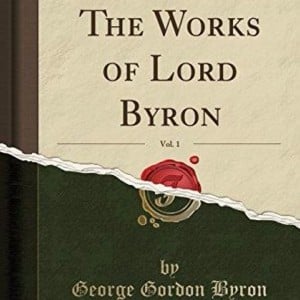
To A Lady Who Presented To The Author A Lock Of Hair Braided With His Own, And Appointed A Night In December To Meet Him In The Garden) Lord Byron
На этой странице вы найдете полный текст песни "To A Lady Who Presented To The Author A Lock Of Hair Braided With His Own, And Appointed A Night In December To Meet Him In The Garden)" от Lord Byron. Lyrxo предлагает вам самый полный и точный текст этой композиции без лишних отвлекающих факторов. Узнайте все куплеты и припев, чтобы лучше понять любимую песню и насладиться ею в полной мере. Идеально для фанатов и всех, кто ценит качественную музыку.

To A Lady Who Presented To The Author A Lock Of Hair Braided With His Own, And Appointed A Night In December To Meet Him In The Garden [1]
These locks, which fondly thus entwine,
In firmer chains our hearts confine,
Than all th' unmeaning protestations
Which swell with nonsense, love orations.
Our love is fix'd, I think we've prov'd it;
Nor time, nor place, nor art have mov'd it;
Then wherefore should we sigh and whine,
With groundless jealousy repine;
With silly whims, and fancies frantic,
Merely to make our love romantic?
Why should you weep, like Lydia Languish,
And fret with self-created anguish?
Or doom the lover you have chosen,
On winter nights to sigh half frozen;
In leafless shades, to sue for pardon,
Only because the scene's a garden?
For gardens seem, by one consent,
(Since Shakespeare set the precedent;
Since Juliet first declar'd her passion)
To form the place of assignation.
Oh! would some modern muse inspire,
And seat her by a sea-coal fire;
Or had the bard at Christmas written,
And laid the scene of love in Britain;
He surely, in commiseration,
Had chang'd the place of declaration.
In Italy, I've no objection,
Warm nights are proper for reflection;
But here our climate is so rigid,
That love itself, is rather frigid:
Think on our chilly situation,
And curb this rage for imitation.
Then let us meet, as oft we've done,
Beneath the influence of the sun;
Or, if at midnight I must meet you,
Within your mansion let me greet you: [i.]
'There', we can love for hours together,
Much better, in such snowy weather,
Than plac'd in all th' Arcadian groves,
That ever witness'd rural loves;
'Then', if my passion fail to please, [ii.]
Next night I'll be content to freeze;
No more I'll give a loose to laughter,
But curse my fate, for ever after. [2]
These locks, which fondly thus entwine,
In firmer chains our hearts confine,
Than all th' unmeaning protestations
Which swell with nonsense, love orations.
Our love is fix'd, I think we've prov'd it;
Nor time, nor place, nor art have mov'd it;
Then wherefore should we sigh and whine,
With groundless jealousy repine;
With silly whims, and fancies frantic,
Merely to make our love romantic?
Why should you weep, like Lydia Languish,
And fret with self-created anguish?
Or doom the lover you have chosen,
On winter nights to sigh half frozen;
In leafless shades, to sue for pardon,
Only because the scene's a garden?
For gardens seem, by one consent,
(Since Shakespeare set the precedent;
Since Juliet first declar'd her passion)
To form the place of assignation.
Oh! would some modern muse inspire,
And seat her by a sea-coal fire;
Or had the bard at Christmas written,
And laid the scene of love in Britain;
He surely, in commiseration,
Had chang'd the place of declaration.
In Italy, I've no objection,
Warm nights are proper for reflection;
But here our climate is so rigid,
That love itself, is rather frigid:
Think on our chilly situation,
And curb this rage for imitation.
Then let us meet, as oft we've done,
Beneath the influence of the sun;
Or, if at midnight I must meet you,
Within your mansion let me greet you: [i.]
'There', we can love for hours together,
Much better, in such snowy weather,
Than plac'd in all th' Arcadian groves,
That ever witness'd rural loves;
'Then', if my passion fail to please, [ii.]
Next night I'll be content to freeze;
No more I'll give a loose to laughter,
But curse my fate, for ever after. [2]
Комментарии (0)
Минимальная длина комментария — 50 символов.












